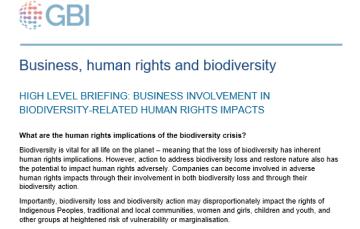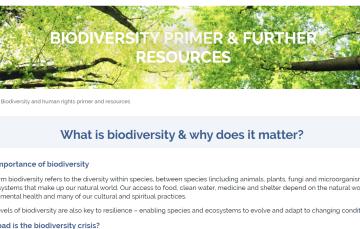Business involvement in biodiversity-related human rights impacts
What are the human rights implications of the biodiversity crisis for companies?
Biodiversity is vital for all life on the planet – meaning that the loss of biodiversity has inherent human rights implications. However, action to address biodiversity loss and restore nature also has the potential to impact human rights adversely. Companies can become involved in adverse human rights impacts through their involvement in both biodiversity loss and through their biodiversity action.
Importantly, biodiversity loss and biodiversity action may disproportionately impact the rights of Indigenous Peoples, traditional and local communities, women and girls, children and youth, and other groups at heightened risk of vulnerability or marginalisation.
GBI has produced this resource for companies looking to get started on this important area of practice. Below you can access further insights, including in our podcast and biodiversity primer to, support your work.
Examples of potential involvement in human rights risks of biodiversity loss
- A company may adversely impact the right to a clean, healthy and sustainable environment through its involvement in biodiversity loss – for example, in connection with land or natural resource extraction, agricultural practices, over-fishing, eco-conversion, deforestation, pollution (air, land or water), packaging or waste management practices.
- A company may adversely impact the rights to life and/or liberty and security where it – or its business relationships – threaten or kill human rights and environmental defenders.
- A company’s involvement in biodiversity loss may result in adverse impacts on the right to physical and mental health, through loss of access to medicine and time spent in nature.
Examples of human rights risks of biodiversity action
- Without meaningful engagement and a commitment to free, prior and informed consent (FPIC), a company’s efforts to conserve and restore nature may adversely impact Indigenous Peoples’ and other traditional communities’ rights, and their connection and access to/use of land and water, intellectual property and cultural/spiritual practices.
- A company may adversely impact land rights through biodiversity action such as bio-offsetting, reforestation, biodiversity conservation and nature restoration initiatives, and transitioning to recyclable packaging.
- Livelihoods and the right to an adequate standard of living of workers and communities may be adversely impacted if a company makes major changes to its business to conserve biodiversity – such as introducing regenerative agricultural practices or shifting agricultural supply chains – or engages in eco-conversion to conserve biodiversity and restore nature.
The rights of Indigenous Peoples
The growing focus on the links between human rights and the biodiversity and climate crises serves to highlight the rights of Indigenous Peoples and other traditional communities.
Indigenous Peoples comprise less than five percent of the world’s population. However, they have protected 80% of Earth’s global biodiversity, despite historic and ongoing contexts of colonisation and continuing marginalisation and other power imbalances. Indigenous Peoples’ critical roles and leadership in addressing the biodiversity crisis are increasingly recognised in legal and policy developments.
Companies should be aware that Indigenous Peoples:
- May be disproportionately affected by biodiversity loss – including as a result of potentially profound impacts on their ways of life, learning, cultural heritage and cultural/spiritual practices.
- May be disproportionately impacted by efforts to address biodiversity loss, including as a result of changes to land access and use, failure to seek and obtain free, prior and informed consent (FPIC), biopiracy and impacts on cultural heritage and cultural/spiritual practices.
- Are likely to be leaders and key partners in many efforts to conserve biodiversity and restore nature.
- May draw on knowledge systems that are different from those used by business and other stakeholders.
Stakeholder expectations that companies across a wide range of industries know and show how they engage with Indigenous Peoples and respect their rights – including in relation to action to address the biodiversity crisis – are likely to strengthen significantly.
Company action to address biodiversity-related human rights impacts
Why should companies address biodiversity-related human rights issues?
- It’s the right thing to do: There is a clear moral, environmental and human rights case to act.
- Companies have a normative responsibility to respect human rights, set out in the UN Guiding Principles on Business and Human Rights: To meet this responsibility, companies should identify and address human rights impacts across their business activities and business relationships – including those that result from involvement in biodiversity loss or action to conserve biodiversity and restore nature.
Companies and other actors are increasingly expected to address the intersections between human rights and environmental (including biodiversity-related) impacts. This trend is reflected in:
- UN General Assembly recognition of the human right to a clean, healthy and sustainable environment (see GBI’s analysis).
- Recognition of the role of business in addressing biodiversity in a rights-respecting way in major global frameworks, such as the Kunming-Montreal Global Biodiversity Framework.
- Increasing integration of human rights and environmental considerations in legal and policy developments, including mandatory human rights and environmental due diligence and reporting initiatives, sustainability reporting standards such as the EFRS, TNFD and GRI, and strategic litigation.
- Integration of human rights and environmental considerations in benchmarking initiatives, such as the WBA Nature Benchmark.
- Emerging expectations from companies’ stakeholders, including investors, civil society organisations and employees.
What's expected of business?
To meet their responsibility to respect human rights, businesses should identify and address
- Human rights impacts of biodiversity loss.
- A business may cause, contribute to or be directly linked to human rights impacts through its involvement in biodiversity loss across its value chain – including through land and natural resource use, pollution, plastic use and waste.
- Businesses should consider how biodiversity loss may affect rights-holders’ risk of vulnerability or marginalisation.
- Human rights impacts of biodiversity action.
- A business may cause, contribute to or be directly linked to human rights impacts through efforts to conserve biodiversity and restore nature across its value chain.
- Businesses across industries should pay particular attention to meaningful engagement with affected people and groups - including, in particular, with Indigenous Peoples.
Practical actions for business

POLICY COMMITMENT
- Update existing policy commitments to recognise links between human rights and biodiversity
- Consider making an explicit policy commitment to Indigenous Peoples’ rights and FPIC

HUMAN RIGHTS DUE DILIGENCE
- Map involvement in biodiversity loss/action across the value chain: consider activities associated with land/natural resource use (including agriculture and fisheries), transport, plastics, packaging and recycling, use of Indigenous Peoples’ knowledge, pollution, water, lobbying, etc.
- Identify and assess actual and potential biodiversity-related human rights impacts, take effective action to prevent, mitigate and redress impacts, track performance and communicate about the company's approach
- Ensure human rights due diligence is informed by meaningful engagement with affected people.

ACCESS TO REMEDY
- Review existing grievance mechanisms to ensure they are fit-for-purpose as regards biodiversity-related human rights impacts
- Ensure the business takes a rights-respecting approach to participation in State-based and other third-party grievance processes in relation to biodiversity-related impacts.

EMBED RIGHTS IN RESPONSES
- Ensure the company embeds a rights-respecting response to the biodiversity crisis
- Build familiarity and buy-in at senior management level and across the business
- Ensure coherence and coordination across human rights and environmental due diligence
- Strengthen capability across key teams – in particular, regarding Indigenous Peoples’ rights.
To find out more on business and human rights and biodiversity, contact Catie Shavin, GBI Legal and Climate Advisor.
Access more on business, human rights and climate here.



